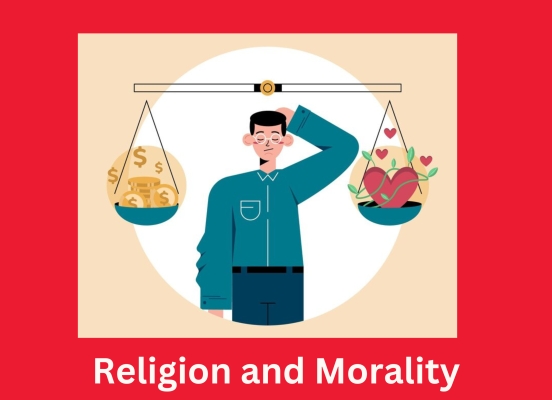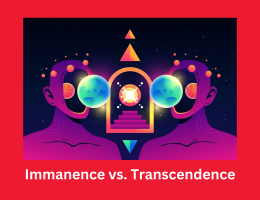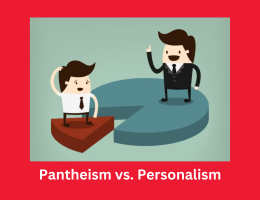
Religion and Morality
- By admin --
- Sunday, 07 Apr, 2024
The interplay among morals and non secular ideals is called the confluence of morality and faith. Religions regularly contain moral codes pertaining to conduct which are supposed to help followers distinguish among appropriate and terrible. The Triple Gems of Jainism, the Sharia of Islam, the Catechism of Catholicism, the Eightfold Path of Buddhism, and the excellent mind, top words, and top deeds belief of Zoroastrianism are some examples of those. Religious government, scriptures, oral and written traditions, and other resources can all delineate and elucidate those frames. Certain theological structures have principles in commonplace with secular price systems along with utilitarianism, consequentialism, and loose notion. Morality and faith aren't the identical issue. Morality is not inherently depending on faith, despite the fact that some people make an nearly automated assumption to that effect. Religion and morality can each depend upon and even develop together. Religion and morality are to be described in another way and haven't any definitional connections with every other, states The Westminster Dictionary of Christian Ethics. Morality and a spiritual cost device are conceptually and theoretically one-of-a-kind kinds of price systems or action courses.
1. Religion and Morality's Relationship
Religious traditions coexist alongside secular value frameworks like utilitarianism and humanism in the big array of moral systems. Religions have a wide type of beliefs. The legal guidelines and rules mounted by their respective gods and as interpreted with the aid of spiritual government inside their respective faiths define proper and evil for adherents of contemporary monotheistic religions inclusive of Islam, Judaism, Christianity, and, to a lesser extent, Sikhism. Religious traditions which are polytheistic are typically much less inflexible. For instance, in Buddhism, the situations and the individual's reason both impact whether a certain motion is moral or bad. Another instance of the ethical differences across non secular traditions is highlighted via Barbara Stoler Miller, who notes that in Hinduism, nearly, desirable and incorrect are judged in keeping with to the instructions of own family, social popularity, and life stages. The hardest part of Hinduism for cutting-edge Westerners to realise is this relativity of values and duties due to the fact they have been delivered up with ideas of equality and universality.
2. Religious Frameworks
Different religious views provide answers for ethical conundrums. For instance, Hinduism acknowledges that killing may be inevitable and certainly vital under some situations however does not outright forbid it. Certain acts, like divorce and abortion, are visible in more absolute phrases in Christian traditions. Regarding the latter, a 2008 study carried out by the Barna Group located that the divorce rate amongst a few denominations is fantastically more than that of nonreligious demographic corporations (atheists and agnostics). Nonetheless, the lowest divorce costs had been discovered amongst Catholics and Evangelical Christians, whereas the lowest number of married couples had been observed among agnostics and atheists.
According to Dixon, Many today argue that non secular ideals are essential to provide moral guidance and requirements of virtuous behavior in an in any other case corrupt, materialistic, and degenerate international. Similarly, it is not possible to differentiate evil from properly except one has an limitless reference factor that's really proper, in keeping with Christian theologian Ron Rhodes. According to Thomas Dixon, Religions simply do provide a framework within which human beings can study the distinction between right and wrong.
3. Social and Religious Aspects
Conceptual variations make the observe of faith and morality debatable. Conflicting consequences may be attributed to a selection of factors, which includes various definitions of faith, incapacity to determine between altruism inside and outdoor of groups, and ethnocentric views on morality. Belonging to a non secular organization might intensify prejudices against participants of the organization as opposed to those outdoor of it, that could account for the smaller percent of friends who're multiracial and the higher reputation of torture amongst churchgoers. According to some studies, the main riding pressure behind spiritual prosociality is the preference to look prosocial, which is linked to the choice to guide one's non secular community. Self-reviews will also be impacted by using the egoistically pushed prosociality, leading to skewed effects. Stereotypes can skew peer evaluations, and a person's group membership can be shown thru enough to skew reports.
4. Religious Values Critique
Religious beliefs can vary from extensively prevalent current ethical beliefs on subjects like homicide, mass killings, and slavery. For instance, Simon Blackburn writes that apologists for Hinduism protect or give an explanation for away its involvement with the caste gadget, and apologists for Islam shield or explain away its harsh penal code or its attitude to ladies and infidels . When it involves Christianity, he contends that the Bible can be examine as giving us a carte blanche for harsh attitudes to children, the mentally handicapped, animals, the surroundings, the divorced, unbelievers, people with diverse sexual habits, and elderly girls . He gives instances, the usage of Exodus 22:18, which states that it helped to burn alive tens or masses of lots of girls in Thou shalt now not go through a witch to stay, states the Old Testament God, who is presumably keen on child abuse, has no troubles with a slave-proudly owning society, and perspectives birth manage as a felony that includes the loss of life penalty in each Europe and America. Blackburn also highlights factors that are ethically dubious inside the New Testament of the Bible.
5. Morality with out religion
Inner values might also and are promoted by way of all principal worldwide religions due to their emphasis on love, compassion, tolerance, forgiveness, and staying power. However, it is not sufficient to base ethics in religion given the nation of the world these days. For this motive, I'm turning into increasingly more convinced that it's time to increase an ethical and spiritual attitude that is going past faith.





